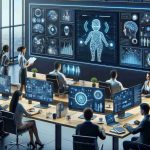The emergence of artificial intelligence (AI) poses significant questions about its effect on employment opportunities. Katharina Grienberger, a leading researcher from the Institute for Employment Research in Nuremberg, sheds light on this pressing issue. Her team evaluates how various professions might be affected by the integration of digital technologies.
Grienberger’s research focuses on assessing the potential of jobs to be replaced by automation. Since 2013, her group has analyzed extensive data on approximately 4,600 professions. They closely examine nearly 9,000 individual job tasks to determine the likelihood that a computer or AI could perform them in the near future.
One surprising finding is the ability of generative AI to take over programming tasks. With advancements in technology, many traditional roles are at risk of transformation rather than outright elimination. The researcher emphasizes that while some jobs may decline, demand for expertise in AI and IT is likely to grow.
Interestingly, higher-skilled professions are increasingly feeling the impact of AI. As companies integrate AI solutions, job roles requiring advanced qualifications are changing rapidly. Consequently, while professions like IT may see saturation, new opportunities in this field will emerge.
In the context of demographic shifts and talent shortages, AI offers a unique solution. Although jobs may evolve, Grienberger believes that AI will not result in massive layoffs; rather, it will shape the labor market in unforeseen ways. The journey ahead seems to promise adaptability and innovation rather than disappearance of jobs altogether.
The Impact of AI on Job Markets: A Transformational Shift
As artificial intelligence (AI) increasingly integrates into various sectors, its effect on job markets is both pronounced and multifaceted. This transformation evokes curiosity and concern among the workforce, policymakers, and educators, prompting a deeper examination of the evolving employment landscape.
Key Questions Regarding AI and Employment
1. Will AI lead to widespread job losses?
– While AI may automate certain tasks traditionally performed by humans, evidence suggests that it will also create new job categories. The World Economic Forum anticipates that by 2025, around 85 million jobs may be displaced, but 97 million new roles could emerge that are more aligned with the changing landscape of work.
2. What types of jobs are most at risk?
– Jobs involving routine, repetitive tasks such as manufacturing, data entry, and customer service are often considered at high risk for automation. However, even advanced roles in fields like finance and law are being reshaped, as AI begins to assist with analysis and decision-making processes.
3. How can workers prepare for this shift?
– Upskilling and reskilling through education and training in AI-related fields are essential strategies. Workers need to embrace continuous learning to stay relevant, focusing on developing soft skills that AI cannot replicate, such as creativity, empathy, and critical thinking.
Challenges and Controversies
The integration of AI into workplaces does not come without challenges:
– Economic Displacement: As AI becomes more prevalent, concerns about the unequal distribution of economic benefits arise. Lower-skilled workers may find themselves disproportionately affected, leading to increased inequality.
– Data Privacy and Ethics: The use of AI systems in hiring and monitoring employees raises ethical concerns about data privacy, discrimination, and accountability.
– Job Quality: While new jobs may emerge, the quality and security of these positions could be inferior. Gig economy roles often lack benefits and job security, leading to ongoing debates about workers’ rights.
Advantages of AI Integration
– Increased Efficiency: AI can handle repetitive tasks faster and more accurately than humans, leading to higher productivity and efficiency across industries.
– Innovation in Job Roles: AI can augment human capabilities, allowing workers to focus on complex problem-solving and creative tasks. This shift can lead to more fulfilling work experiences.
– Economic Growth: The adoption of AI can drive innovation and foster the creation of entirely new markets and industries, potentially spurring economic growth.
Disadvantages of AI Integration
– Job Displacement: The fear of mass unemployment looms as jobs become obsolete due to automation. Transitioning workers may face financial hardship during periods of job retraining.
– Skill Gap: There is a significant gap in skills available in the current labor market versus what is needed in an AI-driven economy. This mismatch can lead to underemployment or unemployment for many workers.
– Social Resistance: The introduction of AI in the workplace may meet resistance from employees concerned about job security and workplace changes.
In conclusion, while AI is poised to reshape the job market significantly, the narrative surrounding its impact is complex and includes both opportunities and challenges. Stakeholders ranging from governments to educational institutions must collaborate to ensure a smooth transition into a future where AI plays a pivotal role in our work lives.
For those looking to explore more on this topic, visit World Economic Forum for insights into global employment trends and innovations.

















